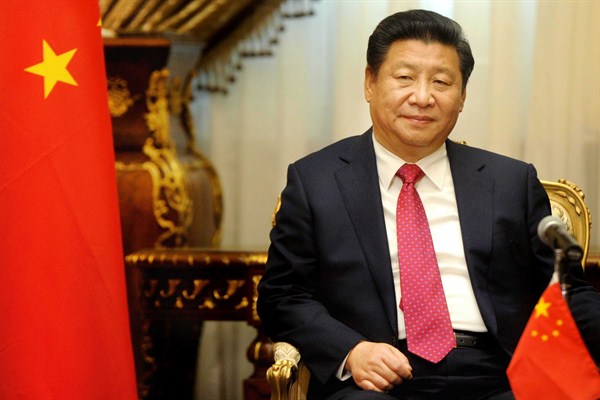Although its previously explosive economic growth has slowed, China’s growing geopolitical clout continues to reshape the balance of power, regionally and beyond. From its relations with the U.S. and its aggressive actions in the South China Sea, to its regional foreign policy and economic prospects, China remains a mixed bag of promise, risk and uncertainty.
The following articles are free for non-subscribers until Feb. 18.
Testing Time for U.S.-China Ties
Xi’s Visit Exposes Mismatch in U.S. and Chinese Expectations
Stock Market Crash Could Derail China’s Financial Reforms for Years
Following Chinese President Xi Jinping’s visit to Washington last September, Timothy R. Heath wrote that incremental progress in relations has “been overshadowed by a deepening distrust” on issues ranging from the South China Sea to Xi’s domestic crackdown on human rights. But although U.S. and Chinese interests don’t always align, Beijing’s global economic clout will require the U.S. and its allies to “respond to Chinese demands for a greater voice in the global order.”
For the past five years, governments have sought to promote norms on cybersecurity, but struggled to limit spying, which isn’t regulated by international law. But last fall, U.S. President Barack Obama and Xi reached a landmark deal on cybertheft. In January, James Andrew Lewis wrote that the agreement, while voluntary, could evolve into binding norms, and will test Beijing’s commitment to both cybersecurity and its rapport with Washington.
High-Stakes Maneuvers in the South China Sea
China’s increased pace of island-building in the disputed South China Sea has angered many of its neighbors, but China insists that its land-reclamation activities are no cause for concern. In June, Mira Rapp-Hooper told WPR that, while land reclamation is not illegal under international law, China’s island-building is undermining the resolution of disputes in the Spratly Islands.
Last year, Xi launched a “charm offensive” to improve increasingly negative perceptions of China in Southeast Asia resulting from Beijing’s provocations in the South China Sea. His visit to Vietnam last November was part of those efforts, but Xi played down the issue during bilateral meetings. In December, Gregory Poling wrote that Xi’s conciliatory diplomacy isn’t sufficient to overcome the damage done by its assertiveness in advancing its maritime territorial claims.
China’s Island-Building Stirs Fears, but Creates Openings for U.S.
China’s island-reclamation activity in the South China Sea is an impressive display of national strength, Timothy R. Heath wrote last May. Yet, as a means of power projection, it also underscores China’s lack of better options. The best response for the United States is to strengthen its own strategic rebalancing efforts in Asia.
Mending Fences in Asia
In early December, China and Thailand finally signed a deal to build a multibillion-dollar railway line linking the two countries. If realized, Prashanth Parameswaran wrote at the time, the move has the potential to not only be a boost for bilateral ties, but a feather in the cap of Beijing’s geopolitical ambitions in Southeast Asia, which have seen some setbacks in recent years, notably with Myanmar and Vietnam.
Last spring, foreign ministers from China, Japan and South Korea gathered to discuss ways to restore trilateral diplomacy. Their relations have been strained for years, not least due to China’s actions in the South China Sea. But, J. Berkshire Miller wrote last April, “trilateralism should not be underestimated,” as it “allows all parties to compartmentalize individual grievances and provides diplomatic camouflage for engagement.”
Despite the pageantry of the much-publicized November meeting between Xi and Taiwan’s president, Ma Ying-jeou, it changed little, Joel Atkinson wrote at the time. Rather, the deep gulf between China and Taiwan should have everyone taking notice. The meeting resulted in few compromises, and to significantly change the tense relationship, Beijing must “start listening to and respecting the Taiwanese, starting with their democratic choice.”
A Volatile Economic Outlook
Stock Market Crash Could Derail China’s Financial Reforms for Years
Even before China’s stock market collapse, there were signs that aggressive market support was damaging longer-term policy, Iain Mills wrote in July. The crash will have a major impact on financial market reform, as the core premise of the Chinese economy—that the government is always in control—has been rocked to the core. Further out, he wrote, the Communist Party may be forced to address deeper inconsistencies about its relationship with the free market.
In December, the International Monetary Fund voted to add China’s currency to a very short list of elite global reserve currencies, joining the dollar, euro, yen and pound sterling. At the time, Daniel McDowell wrote that the decision, while undoubtedly a reflection of China’s economic rise, is also a pragmatic, even savvy, move by the IMF and the United States.
China is an economic titan, but until recently, its impressive rise had not been accompanied by a vision to reshape the global economic order, Daniel McDowell wrote last April. However, with the introduction of the Asian Infrastructure Investment Bank and the promotion of the yuan as a global currency, that began to change, as Beijing slowly works to revise foundational elements of the U.S.-led economic order.

